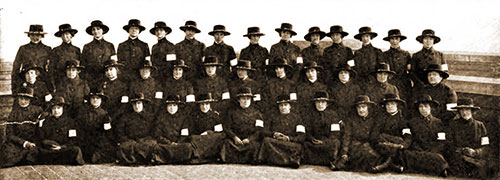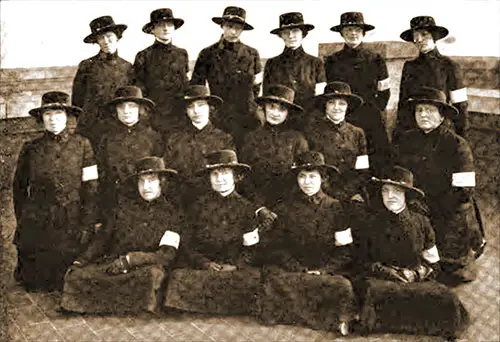Second Unit of Telephone Operators Ready for France - 1918

Second Group of Telephone Operators Ready for France, to Serve with the American Expeditionary Forces. The Telephone Review, April 1918. GGA Image ID # 1927e19cd4
Overseas to Operate
The first group of operators for our army in France has reached the goal toward which every girl in it has been working and striving for many weeks. Behind the lines, in the American camp in France, they are taking their places and adapting themselves to the needs of the war machine.
"Over here," the remainder of the unit of one hundred and fifty girls who have been selected are looking forward eagerly to joining them on the other side, where they, too, can do their bit for Uncle Sam.
The Second Group to Go
The second group, consisting of forty girls, sixteen of whom have been trained by the New York Telephone Company, is ready to leave for France. They have found this to be the thing that they are best equipped for, and are anxious to start without delay. Everyone of them has but one objective in view,—to win the war, and to accomplish it will thrust every thing else into the background.
To those who had the privilege of meeting the girls who applied in answer to General Pershing's call, the spirit of loyalty and eagerness to help that characterized them was a revelation.
Rich and poor ; employed and un employed ; American, French, Italian, Belgian, Swiss, Russian, Indian, British, Canadian, Roumanian, and Greek; governesses, teachers, dancers, scholars, stenographers, lady's maids, dressmakers, clerks, milliners, trans lators, college graduates, interpreters, tutors, students, and some who were living at home without the necessity of earning a living —all vied with each other in an effort to prove their patriotism and willingness to serve. Could there be a more cosmopolitan group of soldiers for Uncle Sam?
French Language Simplified
Most of the girls were not discouraged by their inability to speak French fluently. Like the man who, when asked if he could play the violin, replied cheerfully, "I don't know, but I'm willing to try!" these candidates declared that they would take lessons at once. They expected to be able to converse fluently in French in a month or so. Many had only a superficial knowledge of French grammar, but practically none of conversational French. These, too, were confident that with a few lessons at the Berlitz School they could promptly and easily qualify in the language test.
As a substantial knowledge of French is required of every successful candidate, there were many who were greatly disappointed when they learned that this deficiency would bar them from enlisting in the country's service in this operators' unit.
All Kinds and Degrees
Among those eager to offer their services for Uncle Sam were many who were no mean linguists, — speaking French, Italian, Greek, Ger man, English, Spanish, and other languages,—one, a Greek, claiming to converse fluently in eight languages. A Russian applied, whose mother was a German and was living in Germany at present with other sons and daughters, several of the former serving in the German army. Some of them had been killed in the service of the Kaiser, but, nevertheless, this girl was keenly desirous of doing her share to defeat their cause.
One young lady of English birth had travelled far, and finally reached this country via Australia and San Francisco. She had been helping in King George's Hospital in England, and proudly exhibited her certificate. She laughed at the suggestion of danger, for had she not been through eleven Zeppelin raids and come safely through the submarine danger zone on two voyages? She had worked as a clerk in the munition works and was trying to help in the navy recruiting here in New York at the time of her application. There were many who proudly showed their passports, much viseed, some showing short trips to and from their native country, and others indicating travels in many dis tant lands.
Behind the Scenes
In many cases, the fact that a brother or husband was already in the service has prevented some very eager young ladies from obtaining the coveted opportunity to serve their country "over there." Thereby hangs a tale that sounds more like fiction than real life. During a recent inter view, the applicant seemed to meet all qualifications, and her hopes soared accordingly. Suddenly, they were dashed to the ground, when she dis closed the fact that her brother was in the army in France.

Operators Trained by the New York Telephone Company, Ready to Join the First Group Now Serving in France. Top row: Miss Edith Dodson, Miss Darnaby Henton, Miss Suzanne Coheleach, Miss Marguerit Bleyeres, Miss Ethelyn White, Mrs. Pauline McDermott. Middle row: Miss Louise Essirard Miss Marthe Libert, Miss Frances Perreton, Miss Julie S. Barrcre, Miss Marion S. Taylor, Mrs. Denise Ingram. Bottom row: Miss Margaret Anderson, Miss Anne C. Fox, Mrs. Marie A. M. Mclntyre, Miss Katherine Hay Robinson. The Telephone Review, April 1918. GGA Image ID # 1927eab8da
But orders are orders, and brothers are brothers, so joy was turned into sorrow and happiness into despair, as she sadly submitted to the inevitable. She went home crestfallen. But, the next morning, she returned to the office radiant, and told a story, which, like the truth, is often stranger than fiction. Imagine the amazement of everyone when she told of how she had gone home and told her father of the drawback, and of how, when he realized that this one thing alone pre vented his daughter from being ac cepted for work behind the lines in France, he revealed to her a secret that removed the obstacle from her path! He disclosed the fact that she and her brother, as he was called, were related through marriage only, the boy being the son of his former wife, and not really a blood relation. Thus was the barrier removed, after letters and documents were produced to prove the truth of the story.
Bon Voyage!
And now from time to time, as the units become qualified to perform the tasks for which they have enlisted, they will sail for France, with hearts full of young courage and determina tion to give their best for protecting the right. And as they leave these shores, "for the duration of the war," those at home, wishing them they will be followed by the spirit of Voyage" on their journey.
"Overseas to Operate," in The Telephone Review, Vol. 9, No. 4, April 1918, pp. 110-
